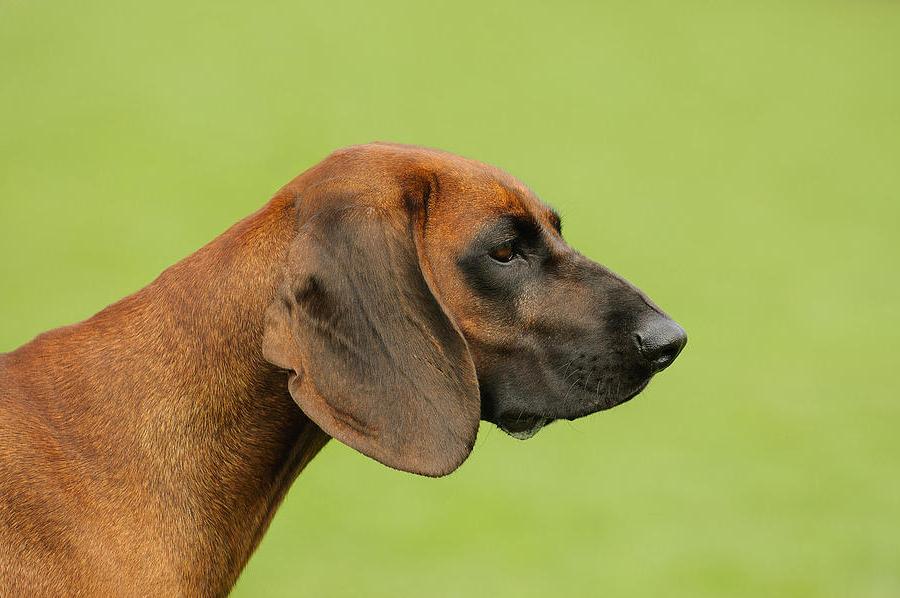- Breed Category: Hound
- Country of Origin: Germany
- Average Height: Males 47-52 cm, Females 44-48 cm
- Average Weight: Males 20-25 kg, Females 18-23 kg
- Average Life Span: 10-14 years
- Grooming Requirements: Low, occasional brushing
- Exercise Requirements: High, needs daily exercise
- Coat Type: Short, dense
- Coat Color Variations: Red, reddish-brown, tan
- Shedding Level: Moderate
- Ear Type: Long, floppy
- Tail Type: Long, straight
- Temperament: Loyal, intelligent, calm
- Intelligence Level: High
- Barking Tendency: Low
- Compatibility with Children: Good with proper socialisation
- Compatibility with Other Pets: Generally good, needs socialisation
- Training Ease: Moderate, requires patience
- Common Health Issues: Hip dysplasia, ear infections
- Dietary Needs: High-quality, balanced diet
- Energy Level: High
- Drooling Tendency: Low
- Sensitivity to Weather: Moderate, prefers mild climates
- Overall Maintenance Level: Moderate
- Original Purpose: Tracking wounded game
- Year of Recognition by Kennel Clubs: 1996
- Apartment Friendly: Not ideal, needs space
- Best Suited For: Active families, hunters
- Cost of Ownership: Moderate
- Unique Traits: Excellent tracking ability
Imagine a dog that embodies the rugged beauty of the Bavarian Alps. The Bavarian Mountain Hound is just that—a breed with a rich history and a distinct character. Known for their exceptional tracking abilities, these dogs are a favourite among hunters and outdoor enthusiasts. This article aims to delve into the breed’s unique characteristics, storied history, and essential care tips.
Originating in the 19th century, the Bavarian Mountain Hound was developed in Germany by crossing the Hanoverian Scenthound with the Red Mountain Scenthound. The goal was to create a dog with a keen sense of smell and the agility to navigate mountainous terrain. Today, they remain a testament to their heritage, combining strength and grace.
Early Development and Role in Hunting
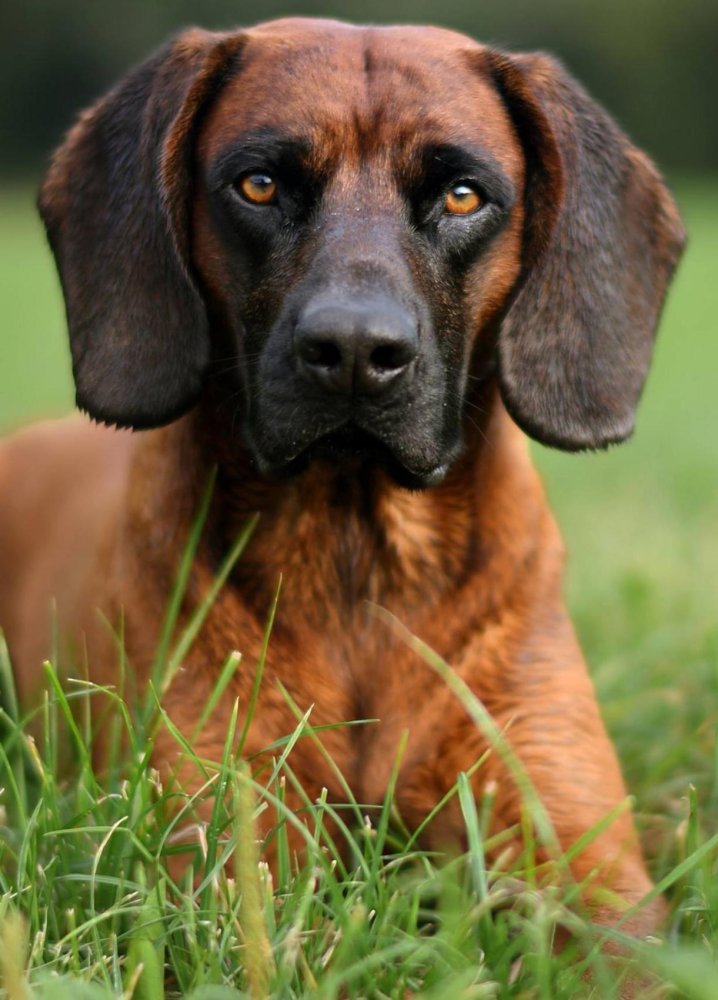
Early Development of the Breed
The Bavarian Mountain Hound’s journey began in the 19th century in Germany. Breeders aimed to create a dog that could excel in the challenging terrains of the Bavarian Alps. By crossing the Hanoverian Scenthound with the Red Mountain Scenthound, they achieved a breed with an exceptional sense of smell and the agility needed for mountainous landscapes. This careful selection process ensured the breed’s ability to track wounded game over long distances, a skill that remains unmatched.
Role in Hunting and Tracking in Bavaria
In Bavaria, these hounds became indispensable to hunters. Their keen noses and determination made them perfect for tracking game, even in the most rugged terrains. They were not just hunters but partners, working tirelessly to ensure a successful hunt. Their ability to follow a scent trail for hours, regardless of weather conditions, made them a favourite among hunting enthusiasts.
Key Historical Figures Involved in the Breed’s Creation
Several key figures played a role in the development of the Bavarian Mountain Hound. Foresters and hunters in the Bavarian region were instrumental in refining the breed. Their dedication to creating a dog that could meet the specific demands of the local environment was crucial. These individuals understood the importance of a reliable tracking dog and worked tirelessly to perfect the breed.
Physical Characteristics
The Bavarian Mountain Hound is a medium-sized dog, known for its muscular build and athletic prowess. They have a distinctive appearance, with a short, dense coat that comes in various shades of red and brown. Their expressive eyes and long ears give them a gentle yet alert look. Built for endurance, these dogs have a strong, agile frame that allows them to move swiftly and gracefully through challenging terrains.
Appearance and Unique Physical Traits
The Bavarian Mountain Hound stands out with its medium size and robust, muscular build. Its coat is short and dense, offering protection against harsh weather, and comes in a range of rich reds and browns. These colours often blend seamlessly, giving the dog a striking yet natural appearance. One of the most distinctive features is their expressive eyes, which convey intelligence and alertness, complemented by long, drooping ears that enhance their keen sense of smell.
Speaking of their sense of smell, it’s truly remarkable. This breed was developed to track game over long distances, and their olfactory abilities are second to none. Their nose is a finely tuned instrument, capable of picking up the faintest of scents, making them exceptional trackers.
Temperament and Behaviour
When it comes to temperament, the Bavarian Mountain Hound is known for its calm and balanced nature. They are loyal and devoted, forming strong bonds with their families. While they are gentle and affectionate at home, they exhibit a focused and determined demeanour when on the trail. These dogs are not just hunters; they are companions, eager to please and quick to learn. Their intelligence and trainability make them a joy to work with, whether in the field or at home.
Personality and Suitability as a Pet
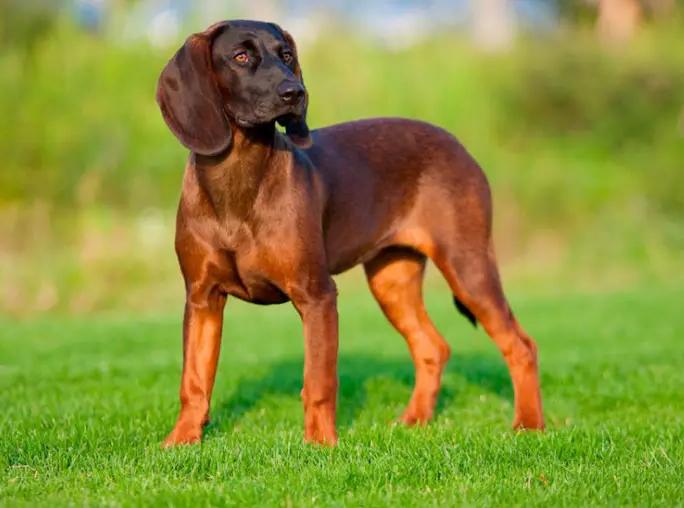
Typical Personality Traits
The Bavarian Mountain Hound is a blend of loyalty, intelligence, and calmness. These dogs are incredibly devoted to their families, often forming strong bonds that last a lifetime. Their intelligence shines through in their ability to learn quickly and adapt to various situations. Despite their hunting prowess, they maintain a calm and composed demeanour, making them a pleasure to have around.
Suitability as a Family Pet and Hunting Companion
As a family pet, the Bavarian Mountain Hound is a fantastic choice. Their loyalty and gentle nature make them great companions for both adults and children. They thrive in active households where they can participate in outdoor activities. As hunting companions, their exceptional tracking skills and determination are unmatched, making them a favourite among hunters.
Interaction with Children and Other Animals
These hounds are known for their friendly and patient nature with children. They are gentle and protective, often becoming a child’s best friend. When it comes to other animals, they generally get along well, especially if socialised from a young age. Their calm temperament helps them integrate smoothly into multi-pet households.
Training and Exercise Needs
Training a Bavarian Mountain Hound is a rewarding experience due to their intelligence and eagerness to please. Consistent, positive reinforcement methods work best. They require regular exercise to keep them happy and healthy, with daily walks and playtime being essential. Engaging them in activities that challenge their tracking abilities can also be highly beneficial.
Training, Exercise, and Health

Importance of Early Training and Socialisation
Getting your Bavarian Mountain Hound started with training and socialisation early on is crucial. These dogs are intelligent and eager to learn, so introducing them to various environments, people, and other animals helps them grow into well-rounded adults. Early exposure ensures they develop confidence and adaptability, making them great companions both at home and in the field.
Recommended Training Techniques
When it comes to training, positive reinforcement is key. These hounds respond well to praise and treats, so keep sessions fun and rewarding. Consistency is important, as is patience. Short, engaging training sessions work best, allowing them to focus and learn without becoming bored or frustrated.
Daily Exercise Requirements and Activities They Enjoy
Bavarian Mountain Hounds are active dogs that need regular exercise to stay healthy and happy. Daily walks are a must, but they also love activities that challenge their tracking skills. Consider scent games or agility training to keep them mentally and physically stimulated. They thrive in environments where they can explore and use their natural instincts.
Health and Lifespan
Generally, Bavarian Mountain Hounds are healthy dogs with a lifespan of around 10 to 14 years. Regular vet check-ups and a balanced diet are essential to maintain their well-being. Like all breeds, they can be prone to certain health issues, so staying informed and proactive about their health is important.
Health and Care for Bavarian Mountain Hounds
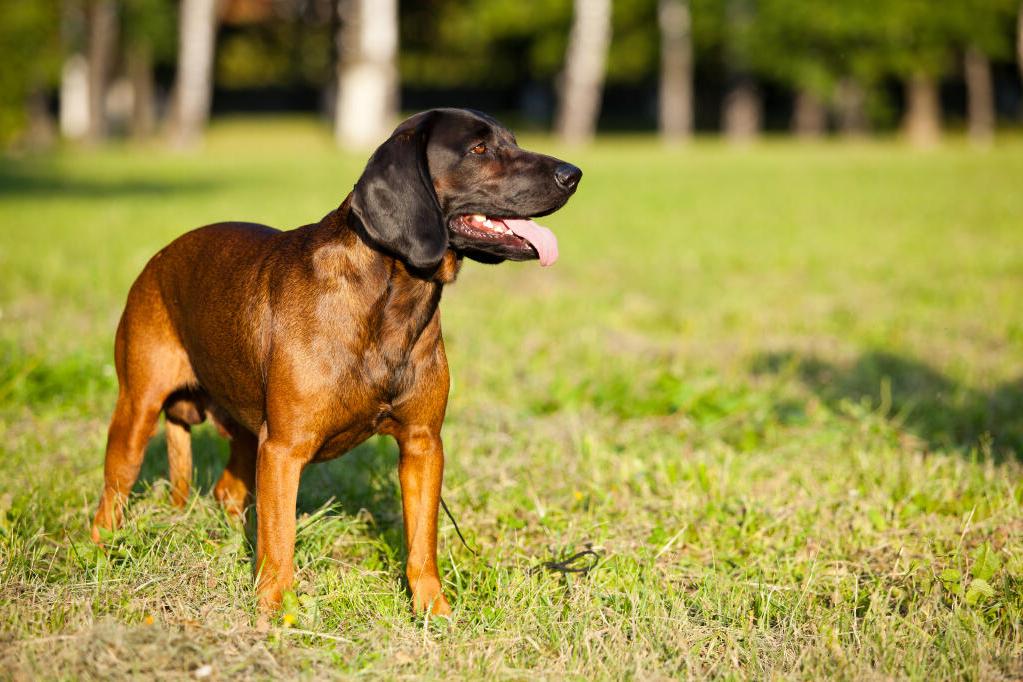
Common Health Issues
Bavarian Mountain Hounds are generally robust, but like any breed, they can face certain health challenges. Hip dysplasia and ear infections are among the more common issues. Regular vet visits can help catch these early, ensuring your hound stays in top shape.
Average Lifespan and Health Tips
These hounds typically live between 10 to 14 years. To keep them healthy, a balanced diet and regular exercise are crucial. They thrive on activity, so keeping them engaged with walks and playtime is key. Mental stimulation is just as important, so consider puzzle toys or scent games.
Preventative Care Recommendations
Preventative care is all about being proactive. Regular check-ups, vaccinations, and dental care are essential. Keep an eye on their ears, especially if they spend a lot of time outdoors, as they can be prone to infections. A good grooming routine will also help keep their coat and skin healthy.
Grooming and Maintenance
Their short, dense coat is relatively low-maintenance. A weekly brush will help remove loose hair and keep their coat looking its best. Regular nail trims and ear checks should also be part of their grooming routine. This not only keeps them looking good but also helps prevent health issues.
Coat Care and Grooming Routines
Shedding and Seasonal Grooming Tips
The Bavarian Mountain Hound’s coat is short and dense, making it relatively easy to maintain. However, they do shed, especially during seasonal changes. A weekly brush will help manage shedding and keep their coat looking sleek. During peak shedding seasons, you might want to increase brushing to a couple of times a week. This not only helps with loose hair but also promotes healthy skin by distributing natural oils.
Diet and Nutrition
A balanced diet is crucial for the health and vitality of your Bavarian Mountain Hound. High-quality dog food that meets their nutritional needs is essential. Look for options rich in protein to support their muscular build and active lifestyle. Fresh water should always be available, and treats should be given in moderation to prevent weight gain. Consulting with a vet can help tailor a diet plan that suits your hound’s specific needs, ensuring they stay fit and healthy.
Nutritional Needs and Feeding for Bavarian Mountain Hounds
Nutritional Needs for Optimal Health
To keep your Bavarian Mountain Hound in top form, focus on a diet rich in high-quality proteins and essential nutrients. These dogs are active and muscular, so they need a balanced diet to support their energy levels and overall health. Look for dog food that lists meat as the first ingredient and includes healthy fats and carbohydrates.
Foods to Include and Avoid
Include lean meats, fish, and whole grains in their diet. Vegetables like carrots and spinach can also be beneficial. Avoid foods high in fillers, artificial preservatives, and excessive fats. Chocolate, grapes, and onions are toxic to dogs and should be kept out of reach.
Feeding Schedules and Portion Recommendations
Feed your hound twice a day, once in the morning and once in the evening. Portion sizes depend on their age, weight, and activity level, so consult your vet for specific recommendations. Avoid overfeeding to prevent obesity, which can lead to health issues.
Fun Facts and Trivia
Did you know the Bavarian Mountain Hound’s incredible sense of smell is so refined that they can track a scent trail over 24 hours old? This makes them exceptional in search and rescue operations. Their unique coat colours often blend with the forest, providing natural camouflage during hunts.
Interesting Tidbits and Famous Bavarian Mountain Hounds
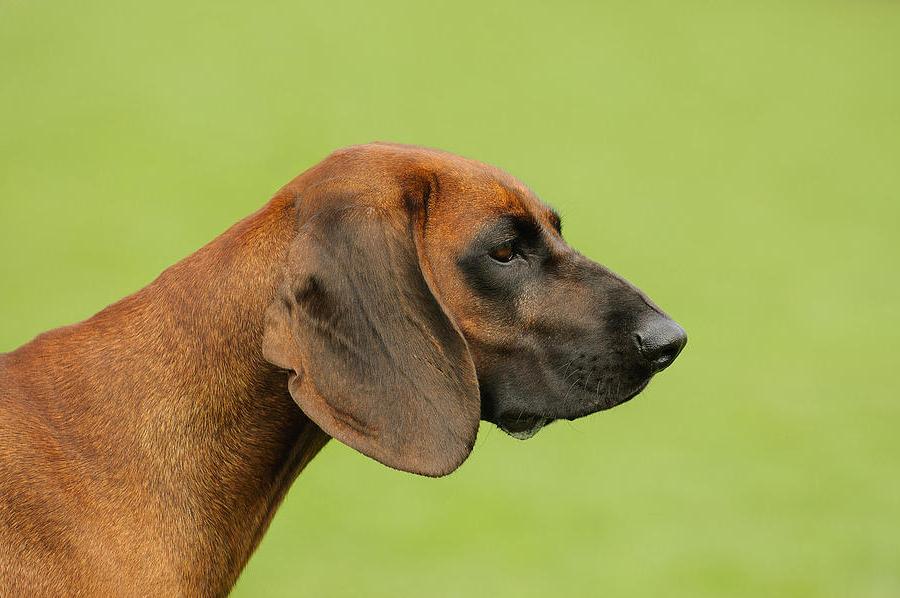
Interesting Tidbits about the Breed
The Bavarian Mountain Hound is not just a skilled tracker; it’s a breed with some fascinating quirks. For instance, their ability to navigate rugged terrains is so innate that they often seem to glide over obstacles with ease. This agility is a testament to their heritage, bred specifically for the challenging landscapes of the Bavarian Alps. Another interesting fact is their unique vocalisation. These hounds have a distinctive baying sound, which they use to communicate with their handlers during hunts.
Famous Bavarian Mountain Hounds in Media or History
While not as widely recognised in popular media as some other breeds, the Bavarian Mountain Hound has made its mark in history. These dogs have been pivotal in search and rescue missions, thanks to their exceptional scent-tracking abilities. In Germany, they are often celebrated in local folklore and hunting tales, where their loyalty and skill are highlighted. Their reputation as reliable and dedicated companions has earned them a special place in the hearts of hunters and dog enthusiasts alike.
Final Thoughts
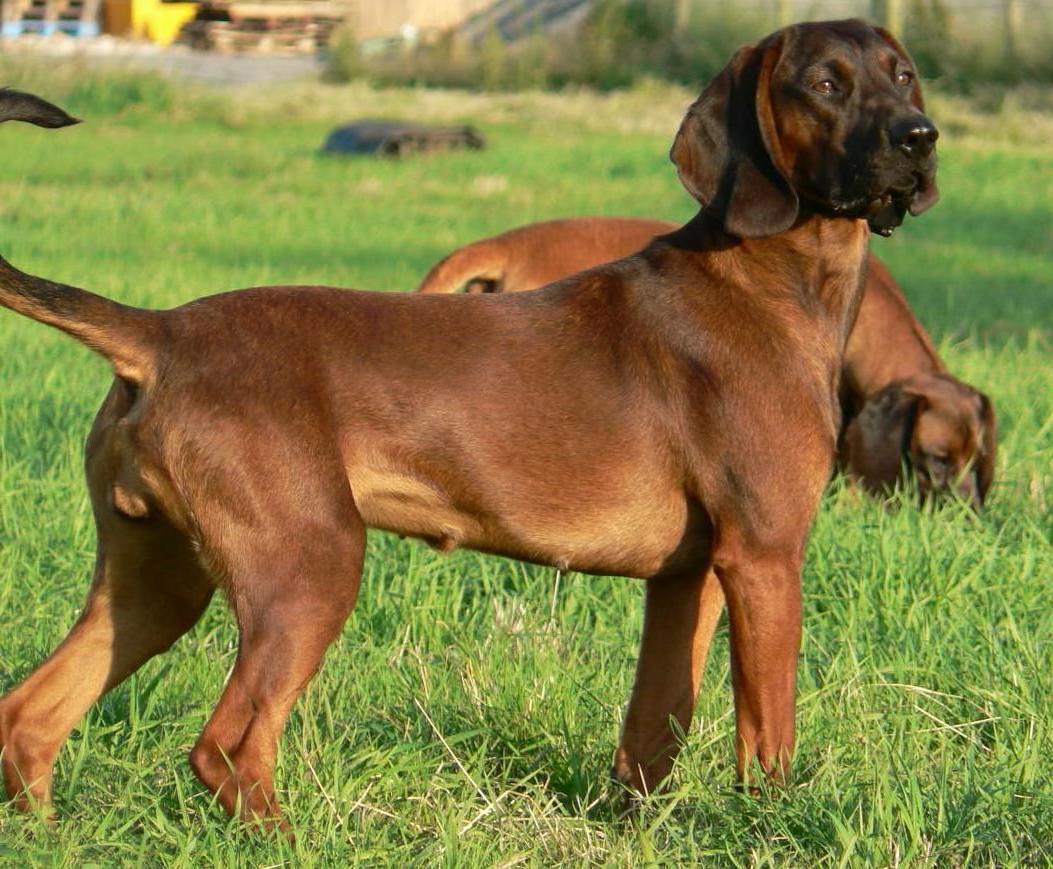
The Bavarian Mountain Hound is a remarkable blend of loyalty and skill. This breed’s exceptional tracking abilities and calm temperament make it a cherished companion for active families and hunters alike. With a rich history rooted in the Bavarian Alps, these dogs offer both companionship and utility, thriving in environments that challenge their natural instincts. Embracing a Bavarian Mountain Hound means committing to an active lifestyle and a rewarding partnership. Consider welcoming this loyal and intelligent breed into your life, and experience the unique bond they offer.
